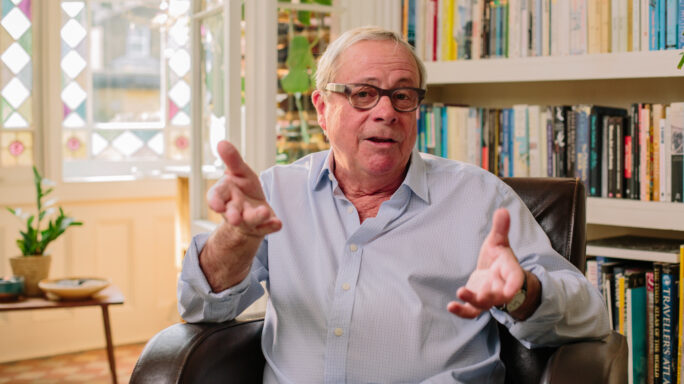Season 2: Unlocking productivity
Empty, Track, Find: 3 simple steps to clear your mind.

In 1936, when America and the world were in the midst of the ongoing Great Depression, Charlie Chaplin produced the famous movie “Modern Times”. I have always loved watching one of its funny opening scenes, where Chaplin’s iconic character “The Tramp” is trying to keep up with an accelerating conveyor-belt assembly line at an industrial factory and hilariously fails at it.
I find it fascinating how strikingly it showcases what many people in the western world struggle with today. We are all trying to cope with the stress of getting everything done, yet feeling that no matter how much we do, somehow we always end up behind and in fear that a slightest drop in our productivity will lead to everything crumbling down around us.
Of course, most of us don’t share Charlie Chaplin’s assembly-line reality, but the fast, never ending stream of tasks, projects, emails, meetings and work still strikes a parallel. We try to control things by making endless to-do-lists, seemingly unaware of that when it comes to productivity, the truth is always “less is more.”
Here’s what I mean by that; true productivity is about being focused, not busy. It’s about being creative, not perfect. It is about doing the right things, not just doing things faster. True productivity is about making sure your work is meaningful, not just making sure you’re getting it done. It’s about finding balance in life, not just working harder. It’s about focusing on one thing, not trying to do all the things at once.
Somehow we have been conditioned to believe that productivity equals “do more, do faster, make bigger in less time” but the way I see it, the true meaning of being productive is to “do the right thing, in the right way, at the right time.” This is why I believe that stress doesn’t come from doing too much. It comes from not doing enough of the right stuff.
For example; when you go to bed at night, the right and most productive thing to do is sleep.
Staying up until late hours in the morning to “get things done,” with just a few hours of rest and then being exhausted the whole next day, is not productive. That’s actually counterproductive. And yet, most of us do this on repeat. Chronic focus on “do more, do faster, make bigger in less time” inevitably leads to mental inertia and lack of creativity. Overwhelm is simply a sign that your mind is cluttered because you try to “hold” to many things in your head while your thoughts and feelings are competing for your attention.
Let’s be clear here; lists, planning and strategies can get us far, but without the right mindset it won’t get us far enough. If what you are “producing” isn’t creating more balance and a sense of freedom in your life then it is counterproductive and you are probably misusing two of the most powerful resources you have at your disposal – Your mind and your imagination.
Let’s start with the Mind.
Your mind is where you store your thoughts, beliefs and feelings. It is your internal Vision Board where you create plans, set goals and make decisions that will shape your future. In other words, your mind is your control center. How you use this “space” determines how you manage your life. A cluttered mind is like a messy room. Not only is it difficult to find what you need there, it is also the perfect breeding ground for procrastination. As long as you keep the mess locked up behind the doors of your mind, the mess controls you.
The other powerful tool is Imagination. Your imagination is the creative energy that organises and transforms your ideas into something new and innovative. You use your imaginative skills to refine your thoughts and fuel your actions. It is the energy that inspires and moves you forward. Without the ability to focus this energy and imagine a compelling future you feel stuck and powerless.
Here are 3 simple steps to clear your mind and start focusing on the right stuff:
1. Empty the room in your head.
Write down all your thoughts, tasks, and projects. Take your time.
It’s important that you let the words flow randomly and freely, in no particular order, without judging or censoring yourself. It takes a lot of energy to hold “everything” in your head, so, get it all down on paper. Now, take a step back and look at it objectively. Your thoughts are no longer abstract energy in the crowded space of your mind, impatiently waiting to be manifested. They are words and sentences written on a piece of paper outside of your mind. You no longer need to hold “everything’ in your head. You have cleared the space.
2. Track your emotions.
Once you have it on paper, you have more clarity. It’s like creating a detailed map of the landscape in your mind.
Now focus on identifying the tasks that really matter by tracking your emotions around each thing, task, or project. Make notes on what you; want, need, have to, love to, don’t want, are afraid of, would be fun, hate, dream of… and again, don’t judge or censor yourself in the process.
3. Find your WHY.
Look at the tasks you’ve identified as emotionally important to you and focus on their end goal (pays the rent, brings me closer to my dream, I enjoy doing it, helps me in my career…). The rest follows easy. When you know why you want to do it, you also know when you need to do it.
This simple practice of Empty, Track, Find will help you use your mind the way it was meant to be used. And the more you do it the easier it is. When we have clarity, we don’t need as many to-do-lists and strategies because deep down in our hearts we always know the right thing to do. The trick is to anchor that knowledge in a clear mind and choose to act on it on a daily basis.





Leave a comment